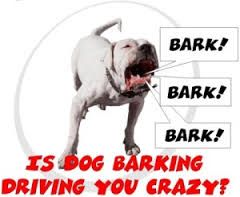Barking is a natural form of communication for dogs and almost all dogs will bark. It is one of the many ways dogs communicate with both humans and other dogs. Dogs bark for many different reasons. It is your job as a knowledgeable pet owner to learn to interpret and understand why your dog is barking. By identifying what your dog is saying when he barks, this will allow you to take the appropriate steps to minimize the negative effects of barking. When barking becomes prolonged or excessive, it can be a problem.

There are several reasons for excessive barking or howling. Some owners have unintentionally encouraged their dogs to bark in puppy hood. Whenever the dog barked, the owners appeared and gave her attention. Finding this behavior rewarding, the dog continued to bark more and more,especially when barking gets them what they want.
Some dogs bark from stress when separated from their owners. Others bark from boredom when they do not have enough stimulation. If your dog is a boredom barker, make sure they receive exercise and play on a daily basis. A dog whose routine has changed so that it’s owner can’t spend as much time with her as usual may become frustrated and anxious and bark.
Sometimes barking can bring an inhibited dog out of his shell. A little bit of well managed, excited barking can bring up a dogs attitude and make him feel energized. But because barking is such an intrinsically enjoyable activity, a dog can take it to the extreme if not carefully monitored.
The ideal solution is prevention. If you have a puppy or new dog, teach them that it is acceptable to be left alone for a period of time. ½ hour, several hours per day and more at night. This should be done gradually, starting with 5-10 minute periods. Also teach your puppy that she has her own space, a crate, pen or specific area where you will visit her. Do not allow access to the whole house. If your puppy is alone in her pen and is crying, wait until a silence occurs before going in and making a fuss. Verbal praise is sufficient,but not too much, you may encourage the barking.
It is natural for dogs to bark when visitors come to the door. Most owners don’t mind this, territorial guarding is natural dog behavior. But don’t let the dog overdo it. You may end up with an excessive barker.
We need to determine which type of barker your dog is. Some dogs don’t like being left alone in the yard or another room. As a result they bark so the owners will tend to their needs, which normally means giving the dog access to human company again. What a powerful reward. No wonder dogs learn to and continue to bark.
Stopping or reducing barking. Begin by reducing the amount of attention the dog receives in a 24 hour period. Ignore all the dog’s attempts to elicit attention. You will find this hard at first, but you must be consistent. Then leave the dog alone by herself for 5 minutes while you are still at home. If the dog begins to bark, do not enter the room. When a gap in barking comes, wait 30 seconds , then enter the room. Do not make any fuss at all. On no account should bursts of excitement by the dog be reciprocated. Putter about for a couple of minutes, then let the dog go free in the house. Be sure that no one pets the dog.
The following suggestions are designed to help keep your dogs barking under control so that it does not get excessive or indiscriminate.
- Never encourage your dog to bark or speak for food. What he may be learning is to manipulate you, not alert you.
- Never encourage your dog to bark as a signal to go outside. This can easily cause you to end up with an excessive barker.
- If your dog barks due to an outside disturbance, investigate first, then quiet him. Don’t allow him to continue barking uninterrupted. He’s done his job by alerting you, and, if not checked, he could become an indiscriminate, excessive barker.
- Never allow him to continue to bark at people. Chances are he’ll never meet anyone who means any harm to him or you. For that rare occasion when danger threatens, his very presence will be helpful. Unless he’s specifically trained and handled by a professional, he probably can’t be a reliable guard dog and a super family pet as well.






